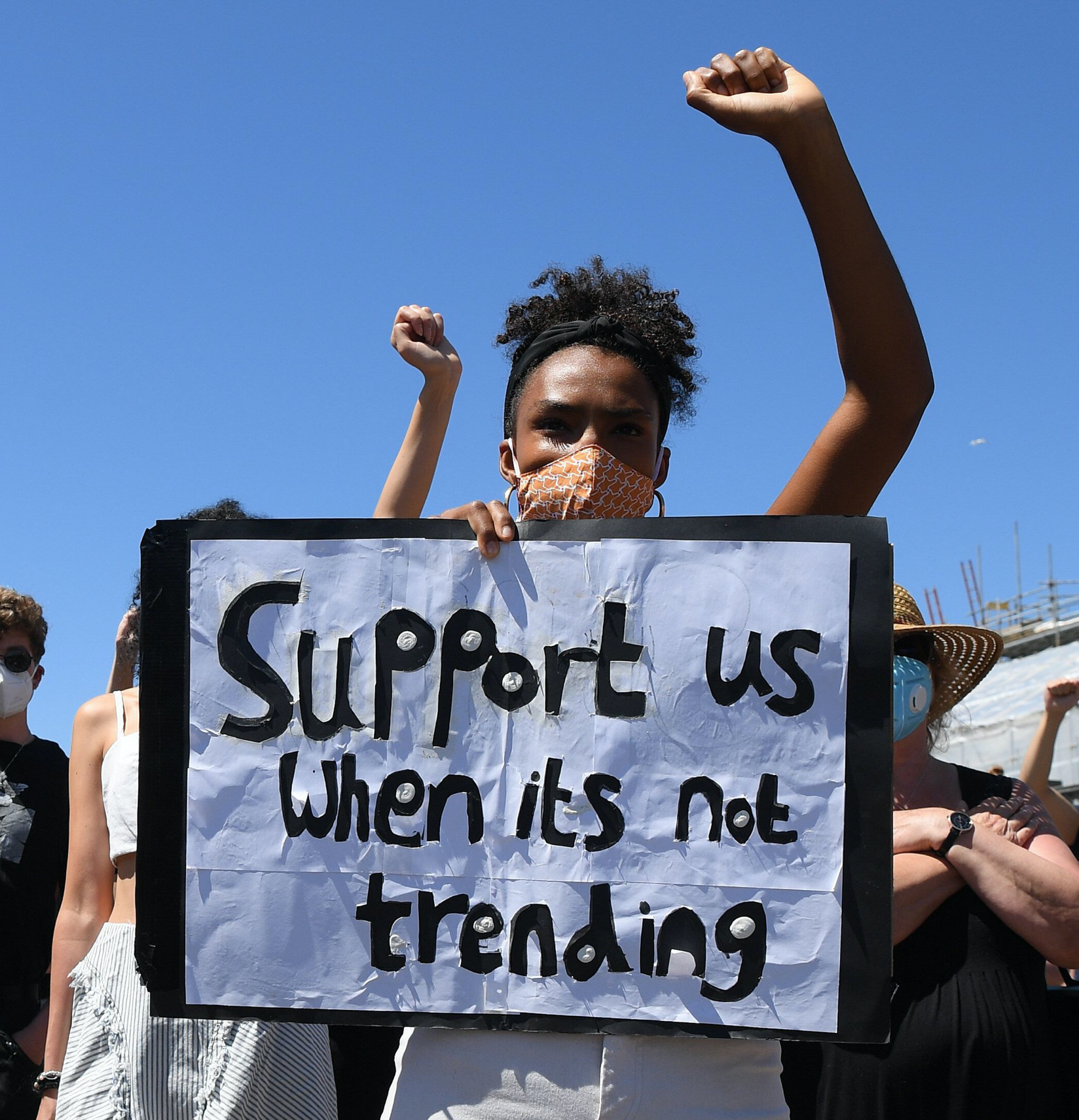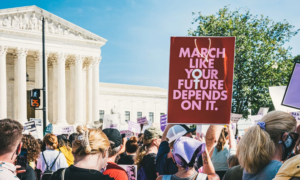“I encourage you to consider what the true needs of your Black classmates are at this moment — are you truly needed in their space?”
“What’s your name, where are you from, and what’s your funniest arrest or police story?”
In my Master’s of Fine Arts Play Rewriting Class at Columbia University last semester, guest speakers were often asked by my professor to pose an ice-breaker to accompany introductions. In prior sessions guests asked questions like, “What is your favorite meal?” or “Who are your playwriting inspirations?” to which I always had a lot to say.
But that question on that day immediately felt different as it echoed throughout my twenty-five-year-old Black male mind.
“Come on! What’s your craziest police story? I want to hear the wild ones,” posed the white female guest lecturer to our group of nine playwrights.
I am the only Black male playwright of the 2021 graduating year; there is one Black woman, and everyone else is white or white-passing. I wrestled with what to say to this seemingly nice and socially aware individual (the play we studied for her visit examines stereotypes women face in media representation).
Do I talk about how my heart stops every time I see a cop car on the road? I wondered. No. Not entertaining.
Do I talk about the day the police interrogated me, without any sense of compassion, about my grandfather’s death as he laid on our living room floor motionless after finally succumbing to stage four lung cancer once my panic-given CPR failed to save his life? Absolutely not. Too traumatic.
I dug deep within the cobwebbed-covered file cabinets of my mind to find a cute interaction with law enforcement, but all I found were tales of police harassment, fear-inducing traffic stops, and discrimination.
However, over the mental ruffling of papers and diary entrees that occurred in my own mind, my ears picked up on the laughter of my classmates. I stopped and listened.
Over the next 20 minutes, I heard my classmates describe stories that I could not fathom ever doing and living to retell as a Black person.
The truth is, life has bombarded me with stories of Black death ad nauseam in recent years.
I watched the world fail to deliver justice to the family of 17-year-old Trayvon Martin in 2012 after he was fatally shot by George Zimmerman, spawning the #BlackLivesMatter Movement in 2013.
I felt the fear of Black mothers everywhere when 12-year-old Tamir Rice’s killing made national news after Cleveland police officer Timothy Loehmann fatally shot the boy in 2014 because the youth dared to play with a toy gun in a public park.
And I heard Eric Garner’s infamous last words, “I can’t breathe,” as New York Police Officer Daniel Pantaleo placed him in a fatal chokehold in 2014.
By the time I was 20, America had conditioned me to accept that the public display and criminalization of dead Black male bodies at the hands of white authority, whether police or vigilante, remained mainstream and almost always unpunishable seven decades after the murder of Emmett Till in 1955.
As I sat and listened to my classmates’ “hilarious” stories, I could not help but wonder if Martin, Rice, Garner, and Till would be alive today if they had skin that resembled my classmates instead of the skin that I see when I look in the mirror. But I already knew the answer to that question.
Finally, the time had come and it was my turn to answer the ice-breaker.
“I’ve never interacted with the police alone,” I said.
I did not have the energy to talk about how triggering the question was or how tone-deaf the resulting conversation had become. I just laughed it off, hoping that we could move on together.
No one cared that the question sent me into a deep mental spiral. No one checked-in on me after class or during the weeks that followed. I was not surprised, for my entire Columbia experience had already been filled with microaggressions and silencing.
Fast forward eight months and a large portion of my Columbia peers in the School of the Arts are now posting daily about the 2020 killings of Breonna Taylor, Ahmaud Arbery, and George Floyd. People who have spoken over me in class, outright called me aggressive, and vilified me in their “all-white group texts,” now “care” for Black people, along with the rest of mainstream America, as the biggest companies in the world scramble to craft brand statements in response to #BlackLivesMatter.
With that sudden burst of care, (which, I am not suggesting is artificial, but I do believe is convenient) has also come “the check-in” spurred by memes like, “Have you checked-in on your Black friends today?” and “white people ― text your Black friends, we are hurting.”
In short, “check-ins,” at their purest, are attempts to make sure a person is okay mentally, which honestly, hold the potential to be great. However, such outreach does not automatically erase the history that white students have built with their Black classmates over the past semester, months, or years.
As a Black student who attended both the Historical Black College and University (HBCU) Morehouse College, is a current student at Columbia, an Ivy League institution, co-founded “Zoomfest: The Theatrical Podcast,” (along with Latinx Producing Student Sean Chia), which celebrates POC, queer, and femme stories, and a panelist for Black and Ivy, a panel discussion series on the Black Ivy League experience founded by Kristen Spencer, the black female playwright in my year, I have encountered white oppression, analyzed its trappings, and uplifted the voices of people who have been stifled by it.
Therefore, I present three questions I think white students should ask themselves before reaching out to their Black classmates in response to the headlines of racial injustice that have dominated the news cycle in recent weeks. I hope you will answer honestly and critically.
1. Have you ever had a conversation with your Black classmate about America’s history of anti-blackness before the killing of George Floyd?
“This is not America,” is a common response to the mainstream coverage of police brutality that I’ve heard in response to the spotlight on high-profile cases like Sandra Bland (2015), Philando Castile (2016), and Renisha McBride (2013) over the years. The assertion that America is not a place where countless numbers of Black lives can be taken without just cause and with no accountability is an assertion of the privileged. America is the powerhouse she is today because of her marriage to Black exploitation and indigenous genocide in her formative years. Black students have wrestled with America’s anti-blackness since our childhoods, so while this may be a new topic for you, know that it is the first hurdle of our mornings every day as we prepare to leave our homes. With this, it is important to accept that your allyship may be too late in the minds of some of your classmates and your check-in may be viewed as opportunistic and an act inspired by white-guilt.
2. Have you ever witnessed your Black classmate experience possible racism/micro-aggressions in the classroom, and if so, what did you do to stop it?
Allyship is bigger than sending a text during quarantine. Part of the reason why the dozens upon dozens of Black students I know have trouble believing the sincerity of many of their white classmates’ check-ins stems from the fact that they are coming from people who have watched them be maligned in person, to which no objections were made. More often than not, from the testimonies of my Black peers and my own personal experience, white people rarely stand up for us in the classroom. Interrogate yourself about your allyship. Is it new or do you regularly stand up for the Black people around you? Know that your previous instances of silence may be a source of distrust or resentment held by your Black classmates and hearing from you right now could twice-traumatize them.
3. Does your Black classmate like you?
The hardest question of all requires you, as a white person, to relinquish the power Western society and beyond has given you since birth over Black bodies. For a moment, stop thinking of your Black classmate as a part of a collective that tragedies happen to and recognize that they still are an individual with hopes, dreams, opinions and a mind of their own. Honestly ask yourself if your Black classmate likes you or if you have any kind of personal relationship with them. Have they texted you about good news in their life? Have they invited you out for person-to-person conversations in which you discussed your favorite foods, bands, or books? Do you know about their family life? Are you aware of how COVID-19 may have impacted their communities? Have they spent any time with you, alone, outside of the classroom ever? If not, then I would like you to truly consider if your classmate would want you in their texts, life, and mind during a time like this. The world may be crumbling in your Black classmates’ mind, so hearing from and feeling the need to respond to a person they don’t care for could add an additional level of stress.
The world is at war with its history at the moment. We, as members of the global community, are experiencing a consistent cycle of traumas that replicates the traumas our eldest ancestors have felt. Pandemics are not new. Wars among leaders are not new. Unfortunately, Black death is not new either.
I encourage you to consider what the true needs of your Black classmates are at this moment. Are you truly needed in their space via text? If you still think so after answering my questions, please check-in on them. Let them know that they do not have to respond in your message, but provide an open channel of communication. Be prepared for any response possible, whether it be anger, frustration, or silence. Do not center yourself in your message. Put them first in the check-in ― and for the rest of your life.
And to those of you that may now realize that your presence might not be needed by your Black classmates right now, thank you. It is a step in the right direction for true allyship in the quest for Black agency.
I encourage you to take these questions with you for the rest of your life and let them be the foundation on which you occupy space with Black people. Do not let your care, concern, and commitment to marginalized communities be reactive. Be proactive going forward and never again wait for social media to tell you when to stand up.
Devon Kidd is a current MFA Playwright of Columba University (’21) based in New York, with aspirations of establishing his voice in various entertainment mediums including playwriting, television, and film. With a passion for writing both surrealist and realist works in fantasy, sci-fi, comedy, and drama, Devon possesses the ability to succeed in numerous genres while maintaining an artistic lens informed by the Black American experience. Before attending Columbia, Devon worked in a plethora of fields including politics, law, marketing, and community outreach, which has greatly influenced the breadth of his creative voice. He graduated Summa Cum Laude in 2016 from the HBCU Morehouse College with a Bachelor’s Degree in English.
Do you have a compelling personal story you’d like to see published on HuffPost? Find out what we’re looking for here and send us a pitch!




